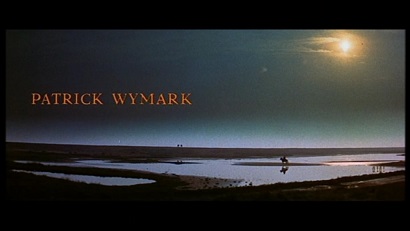
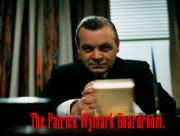
Cromwell

Patrick Wymark appears as Thomas Wentworth, the Earl of Strafford in this Civil War epic starring Richard Harris as Oliver Cromwell and Alec Guinness as King Charles I. One of the last big historical epics, it is a valiant attempt to condense a complex and sprawling period of British history into the length of a movie. It also attempts to make a 17th Century dictator comprehensible to a privileged 1960's audience. .
Like many historical epics, Cromwell has been criticised for its inaccuracies, with the speech and actions of others being attributed to Cromwell and events being muddled (see this review or this alternate view). Writer/Director Ken Hughes had spent 10 years preparing this project, which got the go-ahead after the success of Chitty Chitty Bang Bang (1968). Hughes reputedly researched over 120 books on the Civil War during this time, and it's possible that some of the distortion could have come from trying to reconcile too many views (the disproportionate influence shown by Dorothy Tutin's Queen Henrietta is reputed to have come from a 1960's book, for instance). However, Hughes cut his teeth on the Merton Park, Scotland Yard featurettes, writing and directing imaginative low-budget thrillers based on real-life anecdotes. It's possible that this is very much the Scotland Yard version of the Civil War with facts and characters twisted out of shape to serve the dramatic narrative.
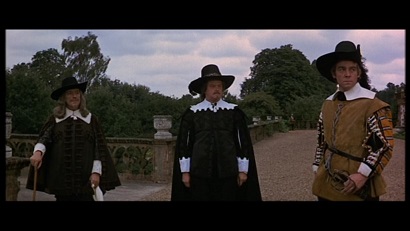
Alec Guinness as Charles I, Nigel Stock as Sir Edward Hyde and Michael Jayston as Henry Ireton
Cromwell began filming in May 1969, soon after Michael Jayston's rise to stardom as Lincoln Dowling in the third series of The Power Game. Jayston appears in the opening sequence as Henry Ireton, portrayed in the movie as an ambitious zealot, keen to over-throw the King and establish a republic. Ireton and John Pym (Geoffrey Keen) intercept Cromwell as he is preparing to leave for America, persuading him to stay and join the newly reconstituted Parliament and oppose the ambitions of the King. In contrast to Ireton, Cromwell is the typical slow-to-anger movie hero, keen to find a negotiated settlement with the King, but gradually disillusioned.
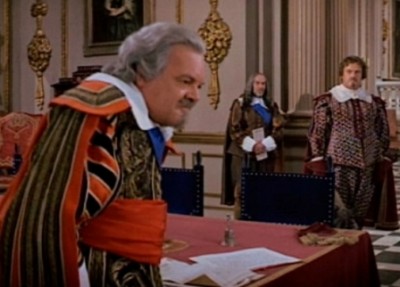
Patrick Wymark plays Thomas Wentworth, Earl of Strafford (referred to as "Strafford" in the movie). Heavily made-up in a white-wig and beard, Wymark staggers around the court on sticks (Strafford suffered from gout), barking in a strong Yorkshire accent like some crippled pit bull. Strafford is recalled from Ireland to advise the impoverished King Charles on how to deal with the rebellious Scots. Strafford joins Queen Henrietta (Dorothy Tutin) in opposing the King's notion to "go hat in hand to the common people" to ask Parliament for money to fight the Scots. The King agrees that Strafford should take on Parliament although he is careful not to specify the details. When Parliament resists, it's Strafford who ends up going to the chopping block, with Charles forced to sign a warrant for his execution. The film gives the impression that Strafford has been sacrificed as a pawn in the King's battle of wills with Parliament, although the facts show that the real situation was much more complex. Pitched against the effete calculation of Alec Guinness' performance, Wymark's performance comes across as broad and slightly comic (an effect heightened by the Carry On Henry depiction of his execution. Strafford is not seen after the King makes his decision - instead Hughes cuts to a quick shot of the falling axe).
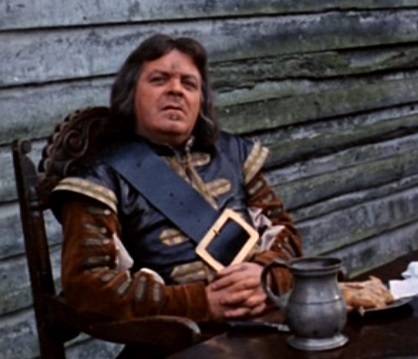
Patrick Wymark had, of course played Cromwell himself, not just in Witchfinder General but also on TV in The Cruel Necessity
Arguably the most controversial aspect of the movie is the way in which events are manipulated to make Cromwell more of an active participant in the early days than he actually was. For instance,both Cromwell and Henry Ireton are shown as being among the five Members of Parliament who the King attempted to arrest for treason in 1642. The fact that Cromwell, as played by Richard Harris, refuses to flee when the King invades the House, gives an entirely different interpretation to Charles' historic words, "I see the birds have flown", with Alec Guinness looking directly at the stoic Harris before turning a blind eye. The impression is given that Charles recognises an adversary who cannot be beaten. Instructively, Peter Flannery's 2008 TV series The Devil's Whore correctly showed that Cromwell was not one of the five members on the list but had Cromwell (Dominic West) persuading Parliament to defy the King, warning the members that the outcome of the King's invasion would determine the future of Parliament. Despite giving more attention to egalitarian Levellers and Diggers, Flannery's script was similar to that of Ken Hughes in emphasising the legend of Cromwell by neglecting to mention those who surrounded ( and at some stages commanded) him.
Douglas Wilmer, who played Fairfax ("demoted from his actual historical role as Commander in Chief") writes amusingly about the makinng of Cromwell in his memoir Stage Whispers. Wilmer recalls that Richard Harris objected to "anything that might show Cromwell in a less than favourable light...regarding anyone opposing him in the plot of the film almost as a personal enemy.". At one point, Harris objected to the scene in which Fairfax refused to sign the King's death warrant and walked out of the chamber. "I'm not having him walking out on me turning this into a fuckin' kangeroo court." When Ken Hughes explained that this is what historically happened and that Fairfax could hardly be expected to sit there and sulk, Harris responded, "Look..what's the fuckin' picture called? Eh? What's it called? Who gives a fuck about Fairfax?"
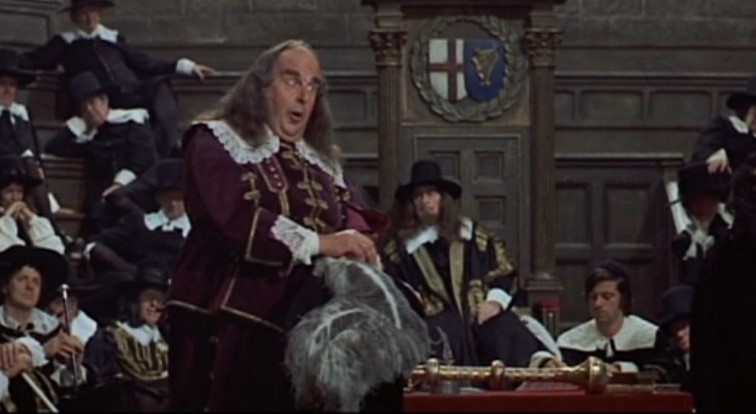
To end on a positive note, Cromwell is stunningly photographed with fascinating design. In some ways it still has a kind of relevance. Robert Morley appears throughout the film as the Earl of Manchester. Inaccurately, of course, he's shown sitting in the House of Commons but if you can ignore that he has one of the best lines in the film. Early on, he's shown throwing common people off the land which the King has gifted to him. As the King comes into conflict with Parliament, we see Manchester shiftily changing allegiance. Towards the end of the film, after the King has been executed and Parliament is unopposed, we see Morley in the House responding to accusations of profiteering. "If we in Parliament can't gain from ruling the country," he says, "There's really very little point in our being here at all!"